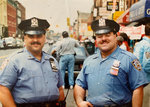DAMASCUS — For people like Joe Costa of Damascus, Pennsylvania, 20 years doesn’t feel that long. He was just one of the first responders who arrived at Ground Zero on September 11, 2001. …
This item is available in full to subscribers.
Please log in to continue |

DAMASCUS — For people like Joe Costa of Damascus, Pennsylvania, 20 years doesn’t feel that long. He was just one of the first responders who arrived at Ground Zero on September 11, 2001. He said he can still remember it like it was yesterday.
Costa worked for 20 years for the New York City Police Department (NYPD) out of Precinct 77 in Brooklyn. He’s also been a volunteer firefighter since 1980, starting with the Dix Hills Fire Department on Long Island.
He retired from the NYPD in 2011 and moved to Damascus with his wife. Barely a year after his retirement he started getting sick. Out of the blue, several different ailments started affecting him all at once, including chronic bronchitis, COPD and asthma.
“I see my pulmonologist every two months at Crystal Run,” he said. “I have good days and bad days. You just deal with it.”
Inside his home in Damascus, Costa has oxygen tanks, a nebulizer machine and various medications paid for by the World Trade Center Health Program.
“I’ve had a couple nodules on my lungs and every year I go for a CT scan.”
Costa has no doubt that his health problems are related to his work at Ground Zero on 9/11 and in the days that followed.
That morning he attended the NYPD’s outdoor gun range at City Island with his partner and sergeant.
“As soon as the first plane hit, they told us over a loudspeaker that they were closing up. We left to go back to our office in Brooklyn. We were on our way there when the second tower got hit,” he recalled.
Costa said they returned to their precinct office to put on their uniforms since they were in plain clothes. From there they ventured into downtown Manhattan, arriving shortly after the second tower had collapsed and parking their unmarked car on a sidewalk near City Hall.
“All you could see was the cloud of smoke and people still running back. We went towards Ground Zero and you couldn’t believe what it was like. It was like someone dropped an atomic bomb there [because of] the way all the buildings and everything was destroyed.”
Costa said they walked around the rubble looking for survivors for about two hours, after which they were assigned to a ferry terminal in New Jersey to assist survivors and other victims.
Over the next few days and nights, Costa was among thousands of others who worked at the pile of rubble at Ground Zero. Many of them sleeping on the floor of a damaged firehouse on Liberty street before waking up for their next 12-16 hour shift.
Costa said at first they had no face coverings when they started working around Ground Zero. He said they were eventually provided with paper masks, which did little to prevent responders from breathing in the toxic dust.
“All you could smell was jet fuel and all those materials that were smoldering. It’s hard to explain. You’ve never smelled anything like it before.” he said.
Costa remembers those days vividly, from the make-shift morgue that was set up at a Brooks Brothers Department Store on Liberty Street where they would examine bodies for any form of identification, to a Family Assistance Center at Pier 94 where relatives of the missing gave DNA samples that could help identify a loved one.
“You learn how to appreciate life after all of that,” Costa says. “You just take one day at a time.”
Even two decades after the terrorist attack, many survivors, emergency responders, construction workers and other volunteers still suffer from a wide range of illnesses caused by their exposure to toxins.
John Tucci, also of Wayne County PA, has over thirty years of law enforcement experience. He was working as part of the NYPD’s Technical Assistance Response Unit (TARA) in 2001. Tucci said he and a few colleagues were having breakfast at a diner in Queens that morning when they were called into Manhattan, arriving shortly before the second plane struck.
Parking on Dey Street just off Broadway and walking toward the disaster, Tucci saw what he recognized as a piece of landing gear from an airplane on the street.
Tucci and others later took shelter in the financial building as one of the towers collapsed, later emerging into a cloud of dust.
“It looked like the apocalypse. People were walking around in a daze,” he said. “I looked like the pillsbury doughboy when I went home to wash off.”
In addition to providing many forms of technical assistance to response agencies, Tucci and his unit were tasked with using special equipment to scan the rubble for cell phone signals to help locate anyone who could still be alive.
Tucci says he has to monitor his health, but it’s not been affected nearly as much as others. He still goes for regular screenings through the World Trade Center Health Program.
“That is one of the very best programs,” Tucci says. “It catches a lot of issues before they become really big problems. It’s a great resource available to everybody who worked down there.”
Despite his health concerns, Costa still keeps busy and finds ways to give back to his community.
He joined the Lake Huntington Fire Department when he and his wife moved upstate. He can’t do much physical work because of his medical conditions, but he still serves as a proud member of the fire police.
“It’s been in my blood for over 40 years,” he said about belonging to a fire department.
Comments
No comments on this item Please log in to comment by clicking here